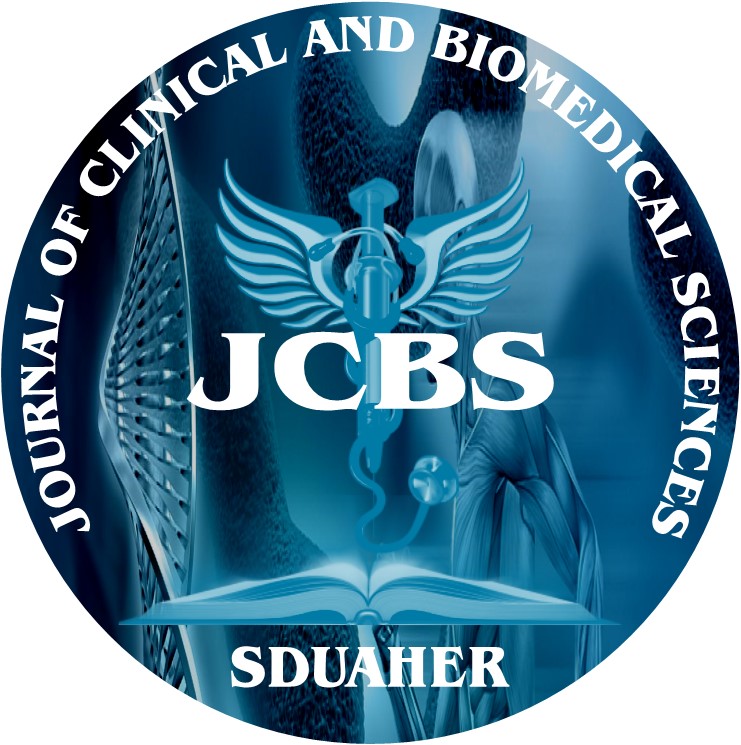


Journal of Clinical and Biomedical Sciences
Year: 2018, Volume: 8, Issue: 2, Pages: 49-56
Original Article
Murthy ANLN1, LakshmaiahV2, AnithaAswathanarayana3*
1. Postgraduate, Department of Medicine, Sri Devaraj Urs Medical College
2. Professor, Department of Medicine, Sri Devaraj Urs Medical College
3. Assistant Professor, Department of Medicine, Sri Devaraj Urs Medical College, Sri Devaraj Urs Academy of Higher Education and Research, Tamaka, Kolar, Karnataka, India
*Corresponding Author
E-mail: [email protected]
Background: Cardiac Autonomic Neuropathy (CAN) represents a significant cause of morbidity and mortality in diabetic patients and is associated with a high risk of cardiac arrhythmias and sudden death, possibly related to silent myocardial ischemia. Cardiac autonomic function should be assessed in most dia-betic patients as it contributes to the evaluation of cardiovascular risk. The presence of CAN should lead to further awareness of possible complications and optimal control of risk factors. Knowledge of early auto-nomic dysfunction can encourage patient and physician to improve metabolic control and to use therapies such as ACE inhibitors and beta blockers, proven to be effective for patients with CAN. Objectives: 1. To as-sess the cardiac autonomic function in patients with Type2 Diabetes Mellitus (T2DM) for detection of CAN. 2. To evaluate the relationship between CAN and duration of diabetes, and glycemic control in Type 2 DM. Materials and Methods: This is a case-control study conducted in Sri DevarajUrs Medical College, Tamaka, Kolar. Sixty patients (Cases) of T2 DM aged > 40 years admitted/visiting Diabetic clinic in R.L Jalappa hospi-tal and 60 healthy non diabetic controls matched for age and sex and satisfied the inclusion and exclusion criteria and gave informed consent for the study were included in the study. All the cases and controls have undergone standard bedside cardiac autonomic function tests. They were evaluated for glycemic control with FBS, PPBS and HbA1c levels. Cases were divided into sub-groups depending on duration of diabetes and glycemic control. The relation between CAN and duration of diabetes and glycemic control was deter-mined by Statistical analysis. Results: 60 cases with diabetes and 60 controls without diabetes were includ-ed in the study. Mean age of cases was 52.38 and controls was 51.97 years. There was no significant differ-ence in age between two groups because of matching. 36 males and 24 females were included in both cases and controls.There was no difference in sex distribution which can be attributed to matching of subjects during data collection. The mean duration of diabetes among cases was 7.28 ± 3.61 years. CAN was present in 21 (35%) of diabetic patients, 13 (21.6%) cases had early features of CAN, whereas CAN was present in 2 (3.3%) of controls and was absent in 86.6% of controls. In the study it was observed that mean age of dia-betics without CAN was 48.54 ± 5.7 years, Early CAN was 52 ± 6.17 and Definitive CAN was 57.38 ± 7.2 yrs. When cases were grouped according to duration of diabetes < 5 years and >5 years, 17.6 % and 41.8% of the cases in each group respectively had CAN, which is significant. About 85.7% of the cases who had CAN have had diabetes for a duration greater than 5 years. Among cases with HbA1c levels > 7%, about 54.54% had definitive CAN and 33.3% had Early CAN. It was observed that there was significant association be-tween increased HbA1c levels and CAN. Conclusion: The present study suggests Cardiac Autonomic Neurop-athy is common in Diabetics compared to healthy individuals. Cardiac Autonomic Neuropathy is associated with increase in the age of the patient and duration of diabetes. Cardiac autonomic neuropathy is associated with poor glycemic control.
KeyWords: Cardiac Autonomic Neuropathy, Glycemic Control, HbA1c, Autonomic Function Tests, Type 2 Diabetes Mellitus.
Subscribe now for latest articles and news.